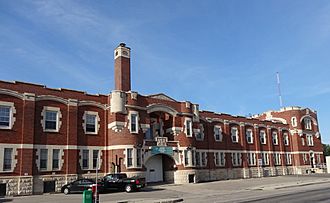Minto Armoury facts for kids
Quick facts for kids Minto Armoury |
|
|---|---|

View of the Minto Armoury from the southeast of the building on St. Matthews.
|
|
| General information | |
| Type | Drill Hall / armoury |
| Architectural style | Tudor Revival |
| Location | Winnipeg, Manitoba |
| Address | 969 St. Matthews |
| Current tenants | The Royal Winnipeg Rifles, Queen's Own Cameron Highlanders of Canada |
| Construction started | 1914 |
| Completed | 1915 |
| Owner | Canadian Forces |
| Design and construction | |
| Architect | David Ewart, Chief Dominion Architect |
| Official name: Minto Armoury National Historic Site of Canada | |
| Designated: | 1991 |
The Minto Armoury is a really old and important building in the West End of Winnipeg, Manitoba. It's a special place where military reserve units train. These units include The Royal Winnipeg Rifles and The Queen's Own Cameron Highlanders of Canada. The building is still used by the military today. It's known for fitting in well with the neighbourhood. This has helped it become a "Recognized Federal Heritage Building."
Contents
Building Design and Style
The Minto Armoury was designed by a famous architect named David Ewart. He was the Chief Dominion Architect for Canada. The building opened in 1914 and was finished in 1915.
Tudor Revival Look
The Minto Armoury shows off a style called Tudor Revival architecture. This style often looks like old English castles or large homes. It has strong, fortress-like features. You can see this in its square towers at the corners. It also has a big arched entrance, just like many old forts.
Special Bricks
The building's unique red bricks came from the Sidney Brickworks company. These same bricks were also used for other important buildings in Winnipeg. One example is the St. Edward’s Roman Catholic Church.
History of the Armoury
The Minto Armoury has an interesting history. It has been a key part of Winnipeg's military story for over a hundred years.
Fire and Rebuilding
On January 22, 1956, a fire sadly destroyed the original wooden roof. But brave responders quickly saved many important items. They rescued military trophies, records, musical instruments, and rifles. After the fire, the roof was replaced. It now has a strong steel structure that is still used today.
National Historic Site
Because of its importance, the Minto Armoury was given a special title. In 1991, it became a National Historic Site of Canada. This means it's a place that tells an important part of Canada's history.
 | John T. Biggers |
 | Thomas Blackshear |
 | Mark Bradford |
 | Beverly Buchanan |

